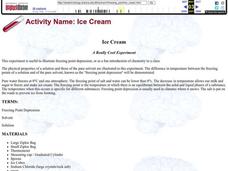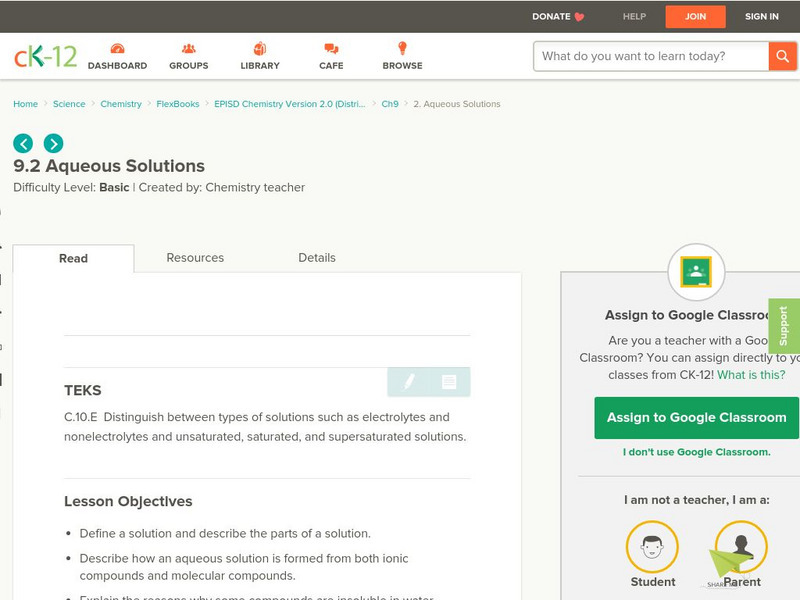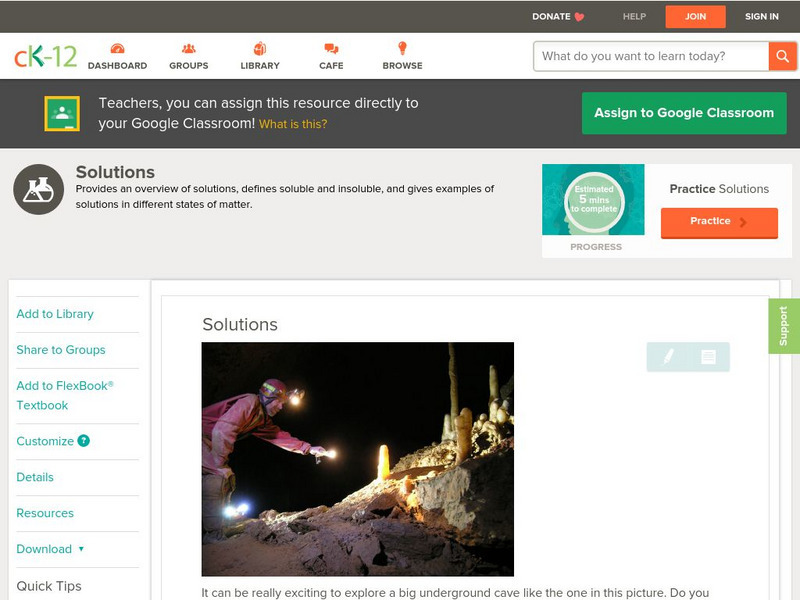Curated OER
Substitution and Elimination Reactions
In this substitution and elimination reactions worksheet, students complete 11 reactions by writing the structural formulas for the products. If no reaction occurs, they write N.R. They also write structures of the products for 3...
Beyond Benign
Breaking the Tension
The tension builds as learners experiment in your classroom. The 17th installment in a 24-part series has scholars investigate the concept of surface tension. After discovering characteristics of surface tension, they add a compound...
Curated OER
How Do I Get a Pure Sample of the Molecules I Make?
Students initially engage in online research and consult print materials to identify a compound to produce. Once a selection has been made, individually, students conduct lab experiments to isolate substances. The end product is a...
Curated OER
Spontaneity, Disorder and Entropy
In this physical and chemical change worksheet, students calculate the entropy change involved in different chemical changes. This worksheet has 4 problems to solve.
Curated OER
Properties of Matter (Biomaterial Through Nanotechnology)
Students investigate friction between different surfaces. In this physics lesson, students research biomaterials that can reduce friction. They calculate efficiency using a mathematical formula.
Curated OER
Acid/Base Indicators
Students use plant materials as indicators of acids and bases. In this acid/base indicators lesson plan, students use boiled beets, cabbage, flowers, teas or berries that have been boiled with alcohol to test various acids and bases....
Curated OER
Ice Cream
Students are shown an experiment making ice cream while discovering the freezing point depression. There are questions for students to answer after the demostration.
Curated OER
Ice Cream
Students explore the concept of the colligative property. Through experimentation, students lower the freezing point of a liquid in order to create a solid by using household ingredients to create ice cream.
Georgia Department of Education
Ga Virtual Learning: Physical Science: Solutions Chemistry
Through interactive puzzles, informational text and video clips, students will investigate the properties of solutions.
CK-12 Foundation
Ck 12: Aqueous Solutions
[Free Registration/Login may be required to access all resource tools.] In this learning module, students will study water's ability to act as a solvent.
CK-12 Foundation
Ck 12: Aqueous Solutions
[Free Registration/Login may be required to access all resource tools.] In the following online tutorial students will define a solution and describe the parts of a solution. They will describe how an aqueous solution is formed from both...
CK-12 Foundation
Ck 12: Physical Science: Properties of Solutions
[Free Registration/Login may be required to access all resource tools.] How solutes affect solvents, the freezing point depression and boiling point elevation.
CK-12 Foundation
Ck 12: Physical Science: Solutions
[Free Registration/Login may be required to access all resource tools.] What a solution is and its different parts, definition of soluble and insoluble. Solutions in different states of matter.
Libre Text
Libre Texts: Chemistry: Solubility and Factors Affecting Solubility
Understand how temperature, pressure, and the presence of other solutes affect the solubility of solutes in solvents.
American Chemical Society
Middle School Chemistry: Lesson Plans: Does Temperature Affect Dissolving?
Students identify and control variables to design an experiment to see whether the temperature of a solvent affects the speed at which a solute dissolves.
CK-12 Foundation
Ck 12: Chemistry: Solute and Solvent
[Free Registration/Login may be required to access all resource tools.] Covers solutes and solvents.
CK-12 Foundation
Ck 12: Physical Science: Solute and Solvent
[Free Registration/Login may be required to access all resource tools.] Definition of solute and solvent and examples. Water as a solvent and how ionic and covalent solutes dissolve in water.
CK-12 Foundation
Ck 12: Chemistry: Dissolving Process
[Free Registration/Login may be required to access all resource tools.] Describes solution formation and interaction of solute with water.
Crescent Public Schools
The Internet Science Room: Solution Concentration
Students have the opportunity to study examples and worked out example problems to further their understanding of chemical solution concentration.
CK-12 Foundation
Ck 12: Solubility
[Free Registration/Login may be required to access all resource tools.] In the following online tutorial students will list examples of solutions made from different solute-solvent combinations and explain three factors that affect the...
Frostburg State University
Why Does the Solubility of Gases Usually Increase as Temperature Goes Down?
This chemistry course article, "Why does the solubility of gases usually increase as temperature goes down?," provides text and related links on the effects of temperature and pressure on the solubility of gases.
American Chemical Society
Middle School Chemistry: Lesson Plans: Why Does Water Dissolve Salt?
Students use their own model of a salt crystal and water molecule to show how water dissolves salt. Then, they relate their observations to the structure of salt, water, and alcohol on the molecular level.
Science Education Resource Center at Carleton College
Serc: Mn Step: Solutions: Solubility and Miscibility
For this activity, learners will test the solubility and miscibility of various substances in water, and explain the chemistry involved. They will also be given a solid and a liquid and asked to predict what will happen when each is...





















